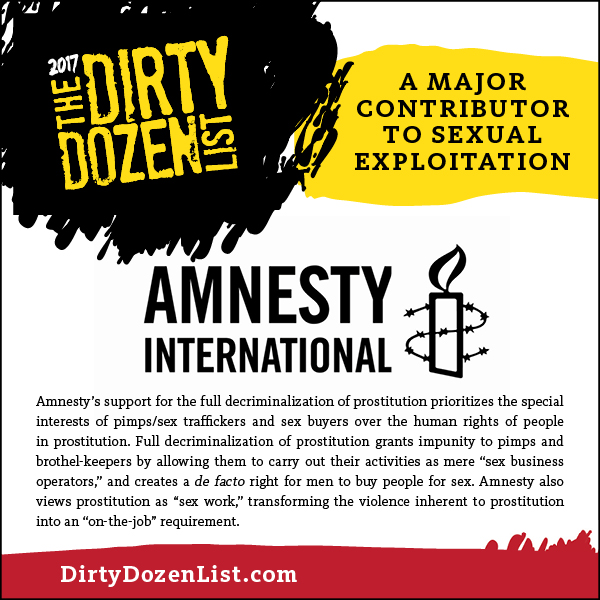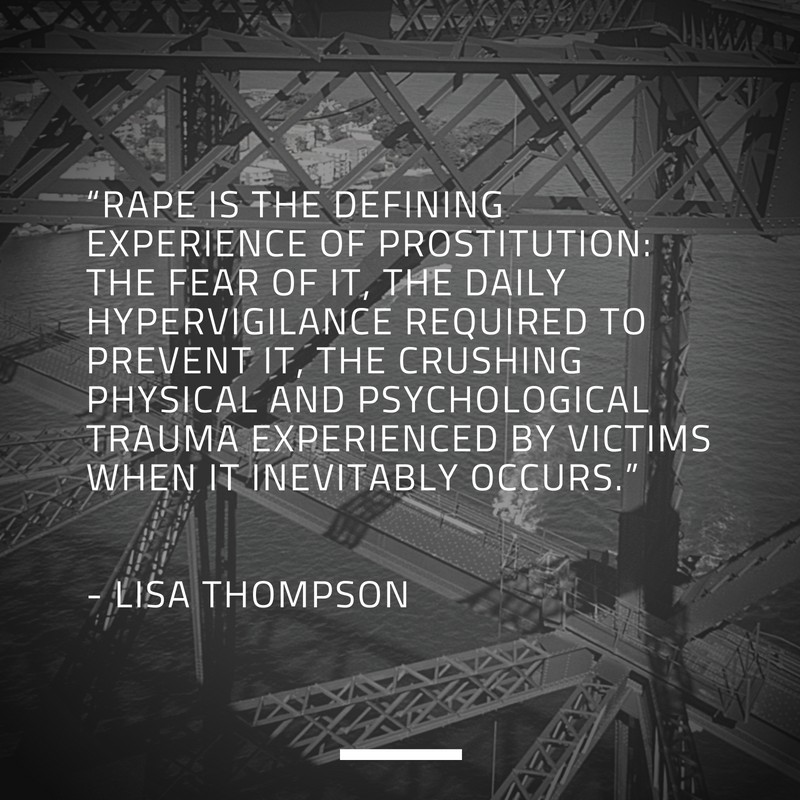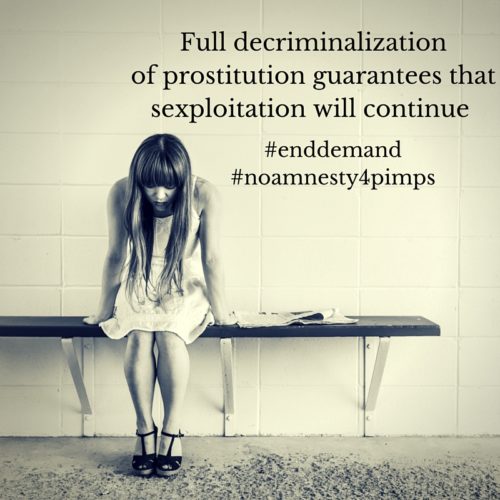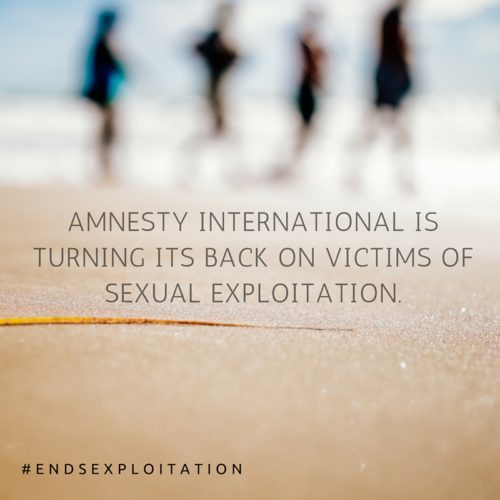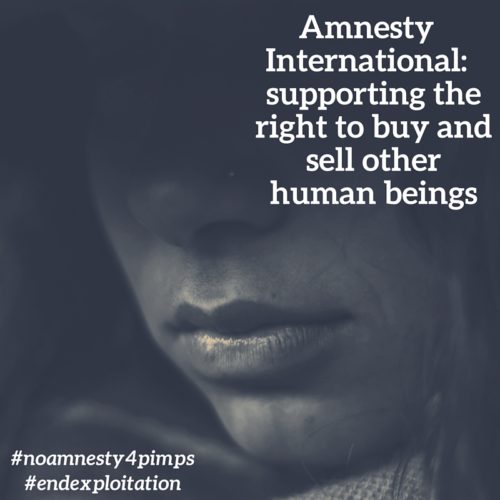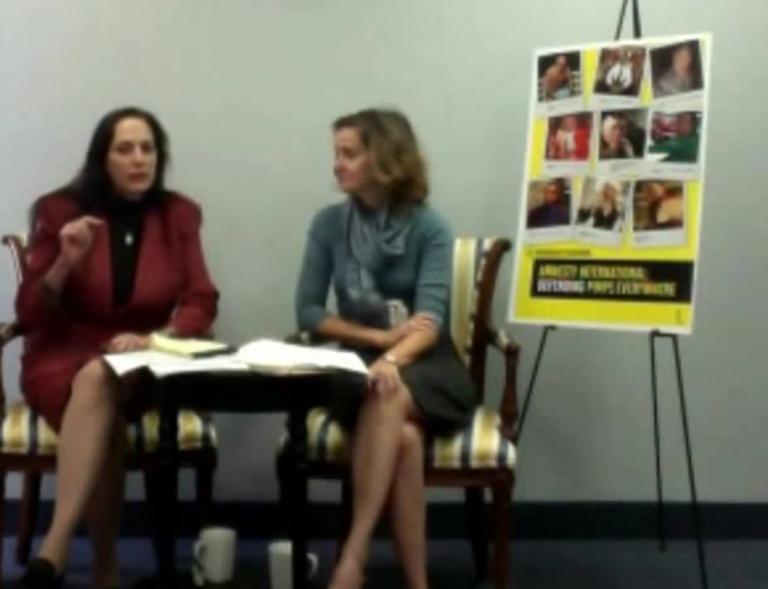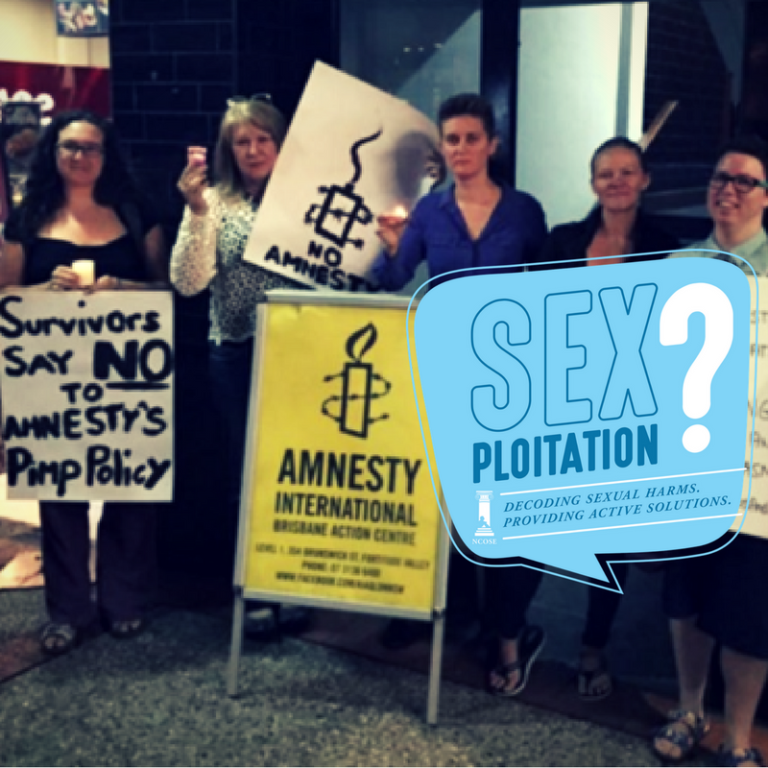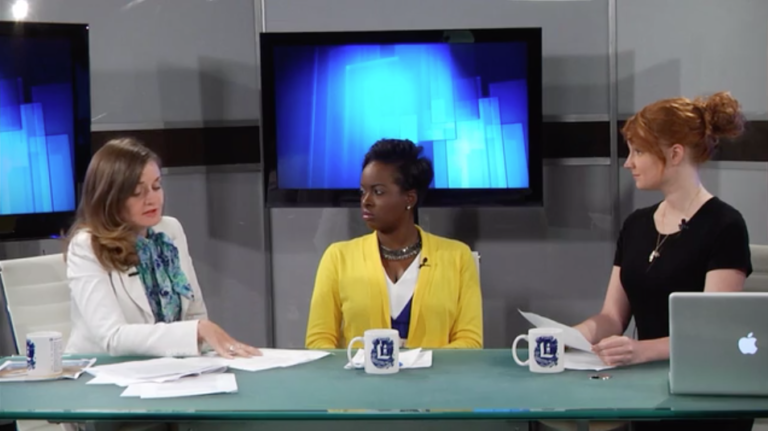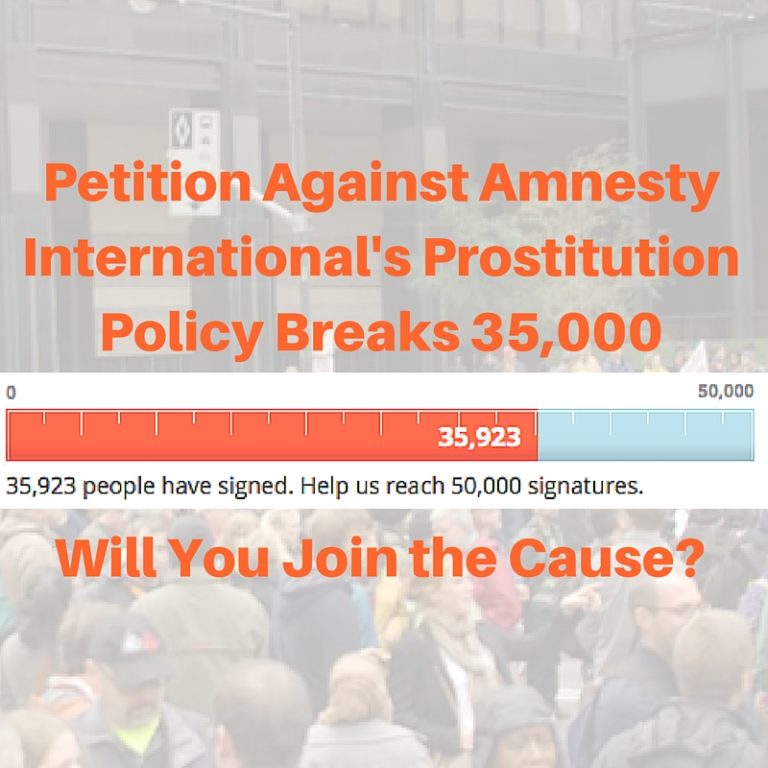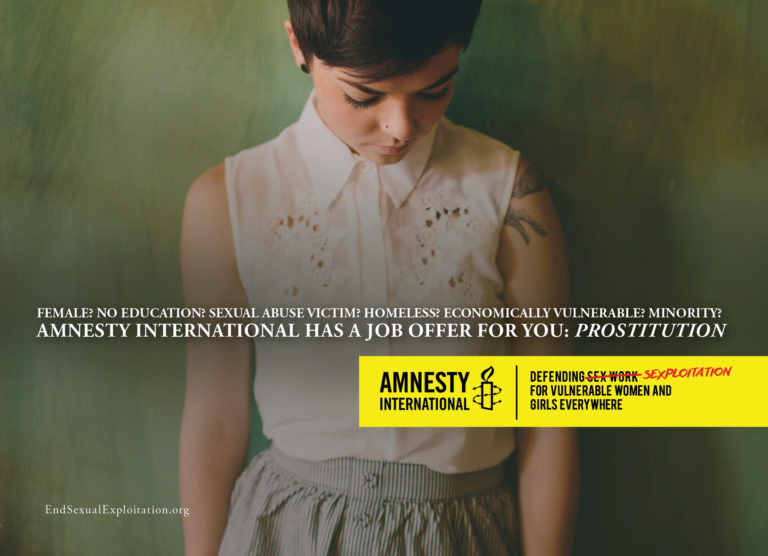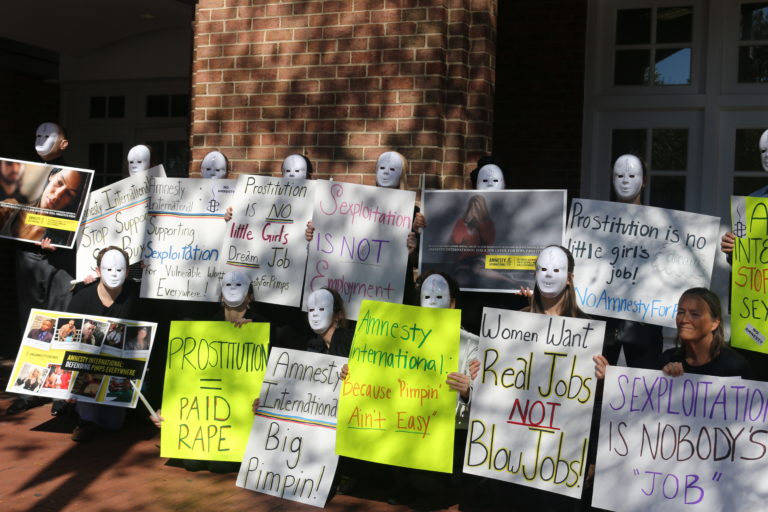
The Problem
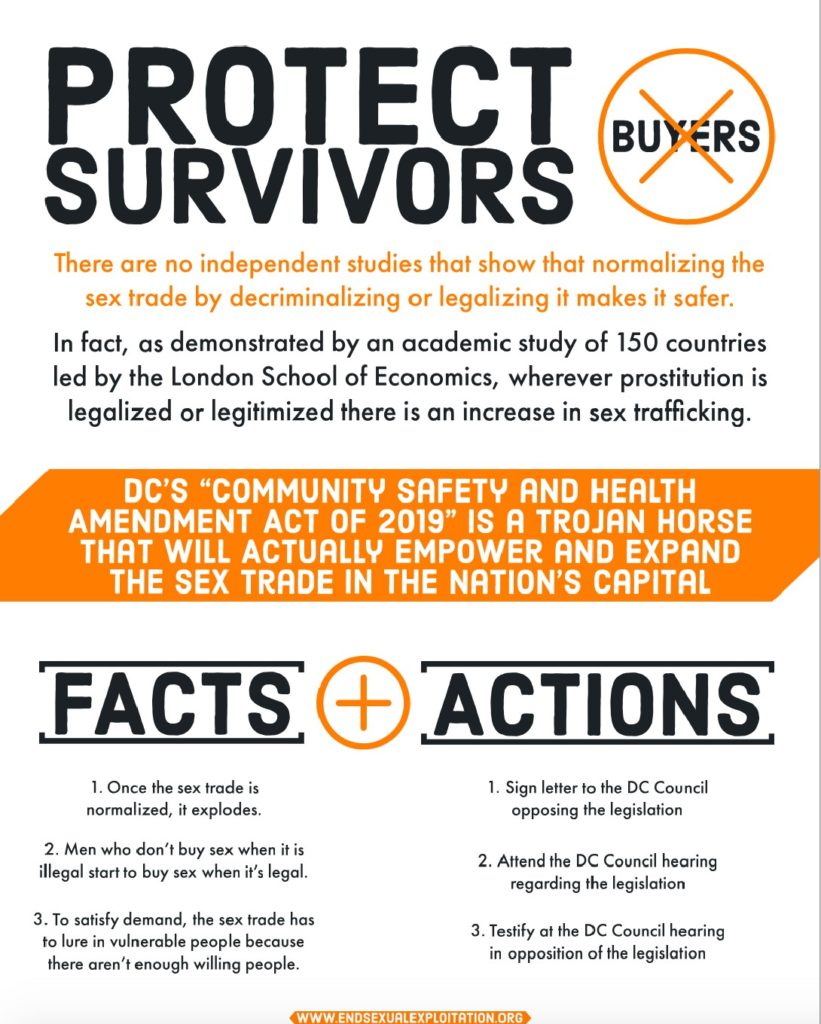
As a matter of both human rights and human dignity, we oppose the commodification of people as objects to sell for sex. Regardless of whether it is regulated or fully decriminalized, prostitution is the organized system whereby human beings are used as public sexual commodities. The sexual exploitation of individuals within this system results in inescapable physical, psychological, and emotional trauma.
Two approaches to prostitution law commonly referred to as legalization and full decriminalization, while distinct from each other, advance the same agenda, namely that: 1) Men should be able to buy and control the bodies of women, men, and transgender persons; and 2) Others should be able to control and profit from the merchandising of people for sex. Both approaches —legalized and fully decriminalized prostitution—unleash the demand for paid sex which, in turn, fuel sexual exploitation, and trafficking and redefine pimping/sex trafficking as an entrepreneurial activity. Thus, both approaches create market-based “on-ramps” to sexual exploitation.
Across the United States, political efforts to normalize the commercial sex industry are popping up, often claiming to protect people in prostitution. Pending before the District of Colombia’s city council, for example, is a bill with the Orwellian title Community Safety and Health Amendment Act of 2019.
Urgent DC Action Needed (2019)
[This urgent action was from 2019, so the details and links might be out-of-date]
DC’s “Community Safety and Health Amendment Act of 2019”: A Trojan Horse Empowering and Expanding the Sex Trade in the Nation’s Capital
Under the guise of improving “community safety and health,” DC Councilmembers David Grosso, Anita Bonds, Brianne Nadeau, and Robert White have put forward the above-referenced bill (23-0318) which, if passed, will amend existing DC statutes to fully decriminalize and deregulate prostitution in the nation’s capital. The proposed bill seeks to decriminalize pimps, brothel-keeping, and sex buyers (i.e., those who “rent” sexual access to the bodies of others). Don’t let the lofty-sounding title of this bill fool you. It is a Trojan horse empowering organizers of sexual exploitation—pimps (i.e. sex traffickers) and brothel keepers—as well as serving the interests of sex buyers.
What the Bill Actually Does (More Details Here)
- Decriminalizes “Pimping” – This bill would become lawful to engage in the sale of other human beings, or one’s self, for sex.
- Decriminalizes Brothel Keeping – This bill would make the operation of brothels not only legal but entirely unregulated.
- Decriminalizes Sex Buying – This bill would decriminalize “soliciting for prostitution” and would, therefore, decriminalize not only those who are sold for sex but also the sex buyers.
What You Can Do
- Attend the upcoming DC Council Judiciary Committee hearing on this bill, scheduled to begin at 10:00 AM on Oct 17, at the WilsonBuilding (1350 Pennsylvania Ave, NW, Washington, DC) in room 412. Ask friends to join you.
- Request to offer 5 minute testimony in opposition to the bill. Sign up to testify by emailing the Judiciary Committee at judiciary@dccouncil.us. In your email, you must provide your name, telephone number, organizational affiliation, and title (if any) by the close of business on Monday, October 14th.
- DC-based organizations and DC residents can sign on to this letter opposing the full decriminalization legislation
What Decriminalization of Prostitution Does
Creates On-Ramps to Psychological Trauma
Prostitution is an organized system whereby human beings are provided and used as public sexual commodities. The sexual exploitation of individuals within this system is fueled by those who choose to buy other human beings for sex. This activity results in inescapable physical, psychological, and emotional trauma. Decriminalization of pimps, brothel-keeping, and sex buyers does not prevent the high rates of post-traumatic stress disorder, depression, and other psychological and emotional harms associated with prostitution, but ensures such harms are perpetuated and multiplied. Decriminalization of pimping and sex buying creates major on-ramps to sexual exploitation by unleashing the demand for commercial sex.
Unleashes Demand
The demand for people to be used for sex is the reason prostitution and sex trafficking exist. Available evidence demonstrates this behavior as being almost entirely engaged in by males.[1] Once sex buying is decriminalized, it explodes, because men who don’t buy sex when it is illegal fearing potential criminal consequences become new consumers when legal barriers are removed. As a 2018 study of 8,000 American men demonstrate, more than 20% of respondents who never bought sex would if it was decriminalized. In Germany, where prostitution and brothels have been legal since 2002, an estimated one million men buy sex each day. Berlin alone has more than 500 brothels.[2] Moreover, sex trafficking cases in Germany increased by 70% between the years 2005-2009 as a result of legalization.[3]
Empowers a Predatory System Exploiting the Vulnerable
To satisfy the demand, the sex trade must lure in vulnerable people, because there are never enough people “available” for prostitution. In a world where homeless persons, sexual abuse victims, foster care children, immigrant and indigenous women, refugees, persons of color, learning disabled, and transgender persons already suffer from lives of political, social, and economic marginalization, it is a travesty of justice to decriminalize those who take pleasure in and literally profit from their sexual exploitation. But full decriminalization of prostitution assents to the sexual exploitation and trafficking of marginalized persons, often based on the false belief that systems of prostitution can be “fixed,” or the dystopian view that prostitution is a “social security” substitute for the poor and disenfranchised. No one should ever be expected to allow men access to their bodily orifices—mouth, vagina, and rectum—in order to obtain shelter, healthcare, social services or to feed themselves and their children.
The real objective of full decriminalization is an unregulated prostitution marketplace, where people can be sexually exploited with impunity.
Importantly, when NCOSE decries prostitution, we are condemning prostitution as a system whereby human beings are openly bought and sold for sex, not the persons used and exploited by that system.
Intersectionality of Prostitution with Sexual Violence
Intersectionality of Prostitution with Sexual Violence and Vulnerabilities
Studies characterize the violence that animates prostitution as brutal,[i] extreme,[ii] common,[iii] startling,[iv] normative,[v] and ever-present.[vi] Indeed, physical and sexual violence across prostitution types is pervasive—whether one is prostituting in Dallas, Texas,[vii] or Lyon County, Nevada,[viii] indoors or outdoors, online,[ix] for drugs or to pay the rent—both the threat of, as well as actual violence, permeate the everyday experience of prostitution.[x] Prostitution is so intertwined with exploitation, harm, and trauma, it can never be viewed as a conventional “business.”[xi] There is no such thing as “safe” prostitution.
In a world where so many homeless persons, sexual abuse victims, foster care children, immigrant and indigenous women, refugees, persons of color, learning disabled, and transgender persons already suffer from lives of political, social, and economic marginalization, it is a travesty of justice to decriminalize those who take pleasure in and literally profit from their sexual exploitation. But this is exactly what legalization and full decriminalization of prostitution does—it assents to the sexual exploitation and trafficking of marginalized persons, often based on the false belief that systems of prostitution can be “fixed” by legalization or full decriminalization, or the dystopian view that prostitution is a “social security” substitute for the poor and disenfranchised.
Yet, no amount of regulation can prevent the high rates of post-traumatic stress disorder, depression, and other psychological and emotional harms associated with prostitution. And, no one should ever be expected to give men access to their bodily orifices—mouth, vagina, and rectum—in order to obtain shelter, healthcare, social services or to feed themselves and their children.
[i] Celia Williamson and Gail Folaron, “Violence, Risk, and Survival Strategies of Street Prostitution,” Western Journal of Nursing Research 23, no. 5 (2001): 463-475; Jody Miller and Martin Schwartz, “Rape Myths and Violence against Street Prostitutes,” Deviant Behavior: An Interdisciplinary Journal, 16 (1995): 1–23.
[ii] Melissa Farley, Jacqueline Lynne, and Ann Cotton, “Prostitution in Vancouver: Violence and the Colonization of First Nations Women,” Transcultural Psychiatry 42, no. 2, (2005): 242–271; Jody Raphael and Deborah L. Shapiro, “Sisters Speak Out: The Lives and Needs of Prostituted Women in Chicago, A Research Study,” (Center for Impact Research, Chicago, Illinois, 2002).
[iii] Melissa Farley, “Prostitution, Trafficking, and Cultural Amnesia: What We Must Not Know in Order To Keep the Business of Sexual Exploitation Running Smoothly,” Yale Journal of Law and Feminism 18, (2006): 101–136; Celia Williamson and Gail Folaron, “Violence, Risk, and Survival Strategies of Street Prostitution,” Western Journal of Nursing Research 23, no. 5 (2001): 463–475.
[iv] Kendra Nixon, Leslie Tutty, Pamela Downe, Kelly Gorkoff, and Jane Ursel, “The Everyday Occurrence: Violence in the Lives of Girls Exploited through Prostitution,” Violence against Women 8, no. 9 (September 2002): 1016–1043.
[v] Farley, “Prostitution, Trafficking, and Cultural Amnesia,” ibid.
[vi] Geetha Suresh, L. Allen Furr, and Aylur Kailasom Srikrishnan, “An Assessment of the Mental Health of Street-based Sex Workers in Chennai, India, Journal of Contemporary Criminal Justice 25, no. 2 (2009): 186-201; Jody Miller and Martin Schwartz, “Rape Myths and Violence against Street Prostitutes,” Deviant Behavior: An Interdisciplinary Journal, 16 (1995): 1–23.
[vii] Tasha Tsiaperas and Claire Ballor, “Killer Who Burned His Backpage Date in ‘World’s Worst Attempt’ at Coverup Gets 60 Years in Prison,” Dallasnews.com, February 1, 2018, dallasnews.com/news/crime/2018/02/01/richardson-man-guilty-killing-backpage-date-worlds-worst-attempt-destroying-evidence (accessed April 9, 2019).
[viii] Rebekah Charleston vs. State of Nevada, (February 2, 2019), devncose.wpengine.com/wp-content/uploads/DKT-No.-1.-2019.02.25.-Complaint.6.pdf (accessed April 9, 2019).
[ix] Legal Momentum and I am Jane Doe, “Backpage, Craigslist, Dating App – Murder List” February 2018, devncose.wpengine.com/wp-content/uploads/Backpage_MURDER-MAP_2018_REFORMAT-1.pdf.
[x] Lisa L. Thompson, “Prostituted and Sexually Trafficked Persons are Rape Victims, Too” SANE-SART Online + Clinical, (March 24, 2016), sane-sart.com/prostituted-and-sexually-trafficked-persons-are-rape-victims-too/ (April 9, 2019).
[xi] Demand Abolition, Who Buys Sex? Understanding and Disrupting Illicit Market Demand, (November 2018), demandabolition.org/research/evidence-against-legalizing-prostitution (accessed March 31, 2019).
NCOSE's Requests for Change
We Stand for the Abolition of Sexual Exploitation
This is why we stand for abolition—legal approaches to prostitution which seek to eradicate male sexual entitlement to the bodies of others through strong penalties, and which provide robust social services to those caught up in organized systems of sexual exploitation to support their exit from the sex trade. For strong policy recommendations that advance these goals, we recommend to you the report by Demand Abolition entitled Who Buys Sex? Understanding and Disrupting Illicit Market Demand.
Its recommendations are:
- Move law enforcement’s finite resources away from arresting and adjudicating prostituted persons and towards arresting and adjudicating buyers.
- Make available short-term federal funding programs to support state and local agencies ready to instigate reforms.
- Use mandatory minimum fines from convicted buyers to offset the costs of survivor exit services and law enforcement operations to stop demand.
- Create increasingly severe penalty structures for repeat buyers, ensuring that sanctions are fair and consistent with survivor testimony of the nature of victim impact.
- Counter messages that normalize sex buying through educational and public health interventions.
- Establish employer policies prohibiting sex buying under any circumstances, including activities on company time or with company resources that are related to sex buying.
- Implement targeted prevention campaigns and focus deterrence communications on behavioral “nudges.”
Research & FAQ's
What is decriminalized prostitution? Is it different from legalized prostitution?
Decriminalized prostitution refers to the removal of laws criminalizing the sex trade. One form of decriminalization—commonly referred to as the Nordic model—targets only individuals involved in the selling of sex (i.e. prostituting persons); other forms of decriminalization may seek to decriminalize all parties involved in the provisioning, buying, and selling of sex. Thus, “full” decriminalization refers to the repeal of laws pertaining to pimping, brothel keeping, and sex buyers, as well as those who sell sex.
Legalized prostitution is generally understood to be regulated prostitution, although the term may also be used to refer to jurisdictions where there is no law explicitly prohibiting prostitution. Under systems of legalized prostitution, various regulations governing how commercial sex transaction are to be conducted are instituted. Such regulations may include brothel licensing requirements and restrictions on where brothels can locate, as well as establish requirements that prostituting persons officially register with the government, undergo compulsory health checks, and pay taxes on proceeds from prostitution.
A third approach to prostitution is known as prohibition. According to this approach all prostitution is viewed as criminal activity and all activities connected with prostitution (i.e. soliciting, procuring, pimping, brothel keeping) are criminalized.
What’s the problem with decriminalization of prostitution?
Across the United States, political efforts to normalize the commercial sex industry are popping up, often claiming to protect people in prostitution.
However, the reality is: There are no independent studies that show normalizing the sex trade by decriminalizing it or legalizing it makes it safer.
On the contrary, where prostitution is legalized/legitimized there’s an increase in sex trafficking, as demonstrated by an academic study of 150 countries led by the London School of Economics.
Why? For several logical reasons:
- Once you normalize the sex trade, it explodes. In Germany, where prostitution and brothels have been legal since 2002, an estimated one million men buy sex each day, coming from all over the world. The capital city, Berlin, alone has over 500 brothels.
- Men who don’t buy sex when it is illegal, become new clients. As a 2018 study of 8,000 U.S. men demonstrates, over 20% of respondents who never bought sex, would consider engaging in exploitation if it was decriminalized or legalized.
- To satisfy demand, the sex trade has to lure in vulnerable people, because there are never enough women willing to be exploited and degraded in prostitution
Sex trafficking cases increased 70% in Germany as a result of legalization.
In The Netherlands were prostitution was legalized in 2000, an estimated 50-90% of women are selling their bodies against their will.
The illegal sex trade increases alongside the legal sector, when it is normalized.
Nevada, the only U.S. jurisdiction with legal brothels, has the highest rates of an illegal sex trade—63% higher than the next highest state of New York and double that of Florida.
Prostitution is inherently dangerous and harmful. The only way to protect people is to shrink the market.
A 2018 study of prostituted women, including trans women, in the U.S. found 61% suffered Traumatic Brain Injuries while in “the Life.”
In a nine-country study of 785 prostituted women, 68% suffered PTSD at same severity as combat veterans and victims of state torture.
The mortality rate of women in prostitution is 200 times the rate of the general population, according to a Colorado medical study examining two decades of evidence.
In an academic survey of women, including trans women, in DC engaged in street prostitution, 42% met the criteria for PTSD, 61% percent reported being physically assaulted, nearly 80% reported being threatened with a weapon, and 44% had been raped in prostitution, with 60% of these rapes committed by sex buyers.
What happened in areas where prostitution has been decriminalized or legalized?
A 2013 study of 150 countries from the London School of Economics found that wherever prostitution was legal, sex-trafficking tended to increase, not decrease.
Further, the state of Nevada (the only state in the U.S. with legalized prostitution in select counties) has the highest rates of an illegal sex trade in the country, adjusted for population. It is 63% higher than the next highest state of New York and double that of California.
Why? Because once something is legal, there is an increased demand for it.
And because prostitution is inherently dangerous and harmful, there are not many women or men who enter into it “willingly.” This means that sex traffickers push victims into the sex trade through force, fraud, or coercion in order to make a profit off of the high demand for commercial sex.
It is essentially impossible for sex buyers to vet and know if the person they are purchasing for sex is a sex trafficking victim or not. Most sex trafficking victims are not held in dungeons with literal chains but are instead imprisoned through psychological coercion and threats, so that they can meet sex buyers at various locations.
What’s the problem with prostitution as long as it’s freely chosen?
The debate about choice in prostitution is always focused on those with the least power and control in the whole equation: the prostituting person. It’s time to discuss the choices of those with the real power—sex buyers, pimps, corporate interests, and governments—and hold them accountable for their choices to promote and participate in sexploitation.
If for nothing else, America is known for the bonanza of choices it presents to those living within its borders, and the freedom it extends to those individuals to pursue them. From the trivial, like what kind of milk (i.e. skim, 1%, 2%, whole, dairy, almond, soy, and a wide assortment of blends) and coffee we drink (ice mocha latte with a shot of espresso, anyone?), to the serious, like the occupations we pursue and those we elect—and everything in between—America affords its residents a cornucopia of choices. Indeed, choice and freedom are viewed by many as part of the American birthright.
In this context, supreme value is placed on the ability to choose, but not on what is chosen. As long as a perception of the freedom to choose exists, most people are happy to let others pursue whatever course they will. However, this “it’s your choice” approach to life, is not without its downsides. Just ask any recently divorced person who was traded in for someone younger and hotter how they feel about their ex-spouse’s choice to move on. Or consider the lives being lost because of the new wingsuiting craze that has motivated people to jump off mountains to experience “flying” but who tragically plummeted to their deaths. Clearly, then, not all choices are created equal.
This is especially true of prostitution. But, ask anyone involved in advocacy efforts or providing social services on behalf of prostituted persons, and they will tell you about the all-too-familiar, pro-prostitution, trump card otherwise known as “the choice argument.” It usually goes down like this: whenever a debate about prostitution arises, pro-prostitution advocates play their “choice card” by raising an argument which asserts that as long as prostitution is chosen, it no longer constitutes exploitation. Any harms that result are just the cost of poor decision making and the full responsibility of the person making the choice. The intended result is to shut down any arguments about the harms, the violence, the inequality, and dehumanization that are all part and parcel of prostitution. After all, to be anti-choice is to be anti-freedom, a proponent of oppression, and an unreasonable puritan, right? Without doubt it’s been a powerful tactic, but let’s examine the claim more carefully.
According to this view, no matter how injurious, dangerous, or pernicious the choice to prostitute may be, we must simply sit back and accept prostitution as a fact of life—as long as it is chosen. But as author and women’s advocate Rebecca Whisnant explains, “That something is chosen or consensual is perfectly consistent with its being seriously oppressive, abusive, and harmful—to oneself and/or to a broader group of which one is a member (e.g. women).” We wholeheartedly agree.
There are lots of choices one can make: to jaywalk, eat foods loaded with trans fat, drive above the speed limit, not wear a helmet while riding a motorbike, smoke, handle a loaded gun, or go wingsuiting in the Alps and many more. But as a civilized society we recognize that choices such as those listed above are potentially harmful to the individuals who engage in them, as well as others around them who don’t. In light of these dangers, society attempts to make rules, restrictions, and barriers on such activities, and in some cases even bans them. Why should it be any different for an activity as imbued with as much risk as prostitution?
To the extent that prostitution is ever truly a choice (for most of the people in it, it most decidedly is not), it’s a choice fraught with danger, and not just run-of-the-mill office place dangers (like slipping on wet floors), but physical and sexual violence that includes things like stabbings, rape, gang-rape, degrading sexual acts, choking/strangulation, beatings with fists or hard objects, kidnap, stalking, threat with a firearm, and torture—to mention a few. (For more on the physical and sexual violence native to prostitution, see our booklet Prostitution: “The Zone” of Raw Male Physical and Sexual Violence.)
Given this degree of potential harm, prostitution hardly seems like a choice that any caring society would sanction. But that’s exactly what happens when governments legalize or decriminalize prostitution—they choose to allow the vulnerable, the desperate, and the reckless to become the prey of the greedy, powerful, selfish, and lascivious. They choose to ensure that a pool of persons are always on supply as public, sexual property, disregarding the many lives that are offered up and the cost to individual bodies, minds, and spirits.
Ironically, the debate about choice in prostitution is always focused on those with the least power and control in the whole equation: the prostituting person. Those with the real power—sex buyers, pimps, corporate interests, and governments—are rarely, if ever, held accountable for their choices. Indeed, if sex buyers stopped choosing to buy sex today, the entire sex industry would disintegrate tomorrow.
Of course, no one is holding their breath waiting for that to happen. However, those who care about people in the sex trade can choose not to build a super highway to sexploitation by fully decriminalizing or legalizing prostitution, but to shrink the opportunities for pimps and sex buyers to operate by creating and enforcing tough penalties on their activities, and fostering pathways out of prostitution for those already in it. That’s the only choice that fosters dignity, wholeness, life and true freedom.
Isn’t prostitution just another form of work?
Argument: Prostitution is sex work.
Response: “Sexual exploitation is nobody’s ‘job.’”
Several years ago the advocacy group Women Hurt in Systems of Prostitution (WHISPER) developed a powerful tool that communicated the extent of the harms experienced by persons in prostitution. Just what was this tool? Answer: a “job” description.
Few things undermine the myth of “sex work” like a detailed list of exactly what people caught up in the sex trade are expected to do¾night after night, day after day, month after month, year after long, miserable, interminable year. For those readers of stout mind and heart, you can read that “job” description here. However, for those who are triggered by depictions of sexual abuse and violence, do yourself a favor and skip the link. We’ll try to convey WHISPER’s message more delicately in what follows, but understand that there is nothingdelicate or tender about the sex of prostitution.
One of the main points at the heart of the debate about the full decriminalization of prostitution (by this we mean the removal of all laws and any regulations around prostitution, the removal of which infer a right for persons to barter and trade other persons for sexual consumption in brothels, strip and night clubs, street corners) is what one believes about work.
While there are several meanings ascribed to the term, for the purpose of this discussion work should be understood as the labor, task, or duty that is one’s means of livelihood. For most people work is a necessary part of ensuring one’s survival: we work as the means to earn our wages and to sustain ourselves and those we love. For some, work may be a drudgery, a toil to be endured; for others, it may be a passion—a lifelong pursuit of one’s deepest interests and aspirations. From banking, engineering, janitorial service, the insurance industry, food service, education, medical professions, agriculture, journalism, law enforcement, aviation, to horticulture and beyond, there are a myriad of occupations in which one may work.
But this work is typically pursued within parameters. As a society we recognize that work should be performed within certain boundaries, and thus create rules concerning how it is carried out, such as the number of hours and days per week one must work, the number of sick days granted, and the minimum wages one can be paid. We also define certain conditions in which the work must be carried out—for instance mitigating the risk of injuries due to environmental hazards, and prohibiting certain activities such as smoking or drug use in the workplace, as well as racial discrimination and sexual harassment.
It hasn’t always been this way. Current labor conditions in the United States are the result of generations of reforms (and even a civil war which resulted in a constitutional prohibition of slavery). And, while the current American labor context is no panacea, in many parts of the world others dream of working under the rights and protections ascribed to American workers.
But whether one lives and works in the United States, Germany, the United Kingdom, Japan, or Brazil, or Italy, Syria, Nigeria, Sierra Leone, Thailand, or anywhere else on the planet, what does it mean if one’s livelihood by means of prostitution is a normalized form of work?
It means that that your daily existence will likely entail:
- routine verbal degradation;
- threat of physical assault and a wide array of physical injury;
- extreme risk of sexual assault and rape;
- being groped, pinched, licked, bitten and breathed upon by people who pay to use you;
- serial utilization of one’s orifices as a receptacle for male genitalia and other objects;
- likely acquisition of alcohol and/or drug addiction;
- likely acquisition of post-traumatic stress disorder;
- likely acquisition of any number of (potentially incurable) STDs; and
- possible premature death as the result of homicide.
In practical terms, it also means that while you experience these abuses and injuries:
- others will have a “right” to profit from the sale of your body;
- others will have a “right” to sexually access your body as long as they paid to do so (and even if they don’t);
- sexual harassment, assault, and rape are on-the-job requirements;
- law enforcement will look the other way, as no “crimes” have been committed;
- the public will at best turn a blind eye to your plight, or at worst mock your abuse by calling it “your job.”
Thus, experiences that the rest of the world’s workers are protected from–or, at a minimum, most rational members of society believe they should be protected from–comprise the core duties and conditions of “employment” for those in prostitution. Some “job.”
At NCOSE we recognize that the overwhelming majority of persons in prostitution around the world have turned to prostitution not because it’s a fantastic experience and they love the “benefits,” but because they were groomed for it, sold into it, can’t escape it, and/or have no other means to support themselves.
But whatever the circumstances by which they became entangled in the sex trade, we believe people deserve better than prostitution. We believe sexual exploitation is nobody’s “job.”
See the NCOSE fact sheet on physical and sexual violence in prostitution for studies and citations.
Did Amnesty International Come Out In Support of Full Decriminalization of Prostitution?
Amnesty International (also known as Amnesty) is a nongovernmental organization founded in 1961 by British lawyer Peter Benenson to defend human rights.
Delegates to Amnesty International’s (AI) biennial International Council Meeting (ICM) held in August, 2015, approved a resolution authorizing AI’s International Board to adopt a new policy calling for the full decriminalization of prostitution worldwide.
Amnesty’s official policy paper on prostitution was released on May 26, 2016. Despite the objections of survivors of the sex trade and women’s rights groups around the world, Amnesty’s paper maintained the organization’s call for full decriminalization of prostitution. Thus, Amnesty joined the global movement seeking to normalize sexual exploitation.
Purportedly, Amnesty is concerned about the corruption, abuses, and violence associated with prostitution. Their answer to these problems is uncomplicated: simply erase prostitution laws from books.
Full decriminalization of prostitution does just that—it removes laws pertaining to all adult parties in prostitution, including not only the individual being purchased for sex, but also sex buyers, as well as brothel keepers, madams, and pimps—sometimes euphemistically referred to as “third-party operators.” If prostitution is decriminalized—meaning there are no laws banning or regulating pimping, sex buying or selling (for those 18 years old and above, they are quick to clarify)—then no prostitution laws are there to be broken, no crimes are committed, and all those concerned can go about the business of buying and selling sex in peace.
If the objective is a vibrant and flourishing sex trade, then full decriminalization of prostitution is the ticket. It removes all legal barriers for those who seek to “manage” sex selling, as well as for those seeking to buy sexual access to other human beings. Thus, Amnesty’s approach for addressing sexual exploitation has been adapted from the old adage, “if you can’t beat them join them.”
At the National Center on Sexual Exploitation, we take a decidedly different view on the matter. We believe prostitution is a system of sexual exploitation that requires Abolition, not social sanction. It is a system whereby individuals are supplied as public, sexual commodities, and which preys upon vulnerable members of society. It is rife with violence against those sold for sex. Full decriminalization of prostitution in no way rectifies the conditions of inequality, abuse, violence, and dehumanization which animate all forms of prostitution—it tragically assents to them.
Inexplicably, Amnesty has failed to recognize that the very act of prostitution should be considered sexual exploitation, since the exchange of money (or something of value) to obtain a sex act is an act of sexual coercion. As legal scholar Catherine McKinnon has argued, “In these transactions, the money coerces the sex rather than guaranteeing consent to it, making prostitution a practice of serial rape.”
Mitigating and eventually abolishing the harms of prostitution requires robust efforts to prosecute those who organize the sexual exploitation of others (i.e., pimps, sex traffickers, madams, brothel keepers, etc.), as well as the sex buyers who utilize their services. Anything less gives pimps and sex buyers a license to engage in sexual exploitation.
In sum, full decriminalization of prostitution grants impunity to sex traffickers, magically morphing them into reputable, sexually-oriented business entrepreneurs, and mystically transforming sex buyers into “respectable” clients.
WARNING: Any pornographic images have been blurred, but are still suggestive. There may also be graphic text descriptions shown in these sections.
POSSIBLE TRIGGER.
Proof
Expert Video Commentary
In 2000 the Dutch lifted the ban of brothel-keeping and by doing so they legalized prostitution. The intentions were good: improve conditions for women in prostitution and combat human trafficking. Almost twenty years later, the Dutch have to admit their policy, which they deemed progressive and pragmatic, has totally failed. As the mayor of Amsterdam admitted lately: the situation in the red light district of Amsterdam has become untenable. Renate van der Zee will explain why the Dutch thought the legalization of prostitution a good idea, why it has failed, and to what consequences.
https://vimeo.com/351794266
The Failure of Legalization of Prostitution in The Netherlands – Renate van der Zee, Abolitionisten Nederland from Center On Sexual Exploitation on Vimeo.
This panel analyzes the harms of legalized and deregulated (or fully decriminalized) prostitution on the prostituted persons, on the rates of sex trafficking, and on gender equality.
https://vimeo.com/350445368
Bright Light on the Red Light: Exposing The Harms of Legal and Deregulated Prostitution from Center On Sexual Exploitation on Vimeo.
Julie Bindel draws on her extensive research on the global sex trade to highlight examples from countries such as Germany, The Netherlands, Nevada, USA, and Australia/New Zealand that show that decriminalization has failed to address any of the problems inherent to the sex trade, and has, in fact, made matters far worse for the prostituted women and men, and those societies in general. Bindel will suggest that the abolitionist (Nordic) model is the only way forward.
https://vimeo.com/350000790
The Disaster of Legalization, and the Rise of the Abolitionist Model – Julie Bindel from Center On Sexual Exploitation on Vimeo.
The Role of Dissociation in Prostitution: A personal and general analysis on dissociation
https://vimeo.com/354292081
The Role of Dissociation in Prostitution: A personal and general analysis on dissociation – Sandra Norak from Center On Sexual Exploitation on Vimeo.
Human Rights Advocates Oppose Amnesty International's Resolution
Amnesty International’s support for the full decriminalization of prostitution prioritizes the special interests of pimps (i.e., sex traffickers) and sex buyers over the human rights of people in prostitution. Full decriminalization of prostitution grants impunity to pimps and brothel-keepers by allowing them to carry out their activities as mere “sex business operators,” and creates a de facto right for men to buy people (the majority of whom are females) for sex. Amnesty also views prostitution as “sex work,” transforming the violence inherent to prostitution into an “on-the-job” requirement.
Most of these quotes from various organizations were collected by AmnestyAction. Please visit their site here.
* Eaves for Women response to Amnesty Consultation on prostitution – “…an approach that only focuses on the fact that prostitution exists is a massive poverty of ambition and abdication of responsibility to the women and girls around the world who may look to women’s human rights activists not only to try to help them while in it but actually to fight for their rights to better options.”
“That a human rights approach should be building and enforcing equal access to education, training, freedom of movement, financial autonomy, lives free from violence and the threat of it which is not dependent on prostitution. A human rights approach claims to speak truth to power – that means challenging demand for prostitution and attitudes to women, not reinforcing them.” more here
* SPACE International public statement – “We object in every way to the message and tone of this document, beginning with its title which, by framing prostitution as ‘Sex Work’, obscures the very nature of prostitution itself. Prostitution is abusive and exploitative sexual violence against humans, most often women and girls, carried out by other humans, usually grown men, who are in positions of relative social, racial and financial privilege to the human beings whom they buy for sexual use and abuse.” more here
* India’s victims of prostitution and poverty alliance (VOPPA) and survivor speak, Maine, US speak out to Amnesty International – “We are members of the Victims of Prostitution and Poverty Alliance in India. We would like Amnesty International to include our right not to be prostituted in their upcoming resolution. We are from the most marginalized section of society. We are poor, female and low-caste, often from groups labeled as nomadic tribes under British colonialism and from minority religions.We would like Amnesty to recognize that our prostitution is an absence of choice and not a choice. We request you as Amnesty India to take into account the lived experiences of the most marginalized low-caste and poor women and girls in India who want protection from our exploiters, not their impunity. We want you to call on states to invest in our basic needs. Our basic needs are our “human rights”…
* CATW International – “A vote calling for legalizing pimping would in effect support gender apartheid, in which some women in society can demand protection from rape, discrimination and sexual harassment, while others, the most vulnerable among us, are instead set aside for consumption by men and for the profit of their pimps,” said Taina Bien-Aimé, CATW’s executive director. “This is far from what Eleanor Roosevelt envisioned for the world when she penned the Universal Declaration of Human Rights.”
* Prostitution survivor Rachel Moran “…In its recently leaked “Draft Policy on Sex Work”, Amnesty displays its blind ignorance… The document itself is a sight to behold. It refuses to recognise that commercial sexual exploitation is a highly gendered abusive practice, and in numerous places throughout the document, Amnesty considers recommending the decriminalisation of punters, pimps, brothel owners and others who exploit women for financial gain or sexual gratification in the global sex trade.
…One would expect that Amnesty would know their resolution is in direct contravention of at least three UN Conventions. Since they are ignoring the fact, it is timely to remind them… …Where prostitution has been given the government’s stamp of approval and repackaged as legitimate “sex work”, there is no onus on governments to provide exit strategies – any more than they’d be expected to provide exit strategies for women in nursing, hairdressing or childcare. Women like this are simply abandoned by the state.”Author of Paid For, published in NewStatesman
* Sex Trafficking Survivors United – “It was shocking for us to see Amnesty’s suggestion that it is a “human right” for well off, powerful (mostly white) men to purchase the bodies of the younger, poorer and more vulnerable. We found it especially cruel that Amnesty says prostitution is a choice. As all survivors know, people end up in prostitution because they have no other choices, and are the victims of coercion, fraud, abuse and violence. The untruth that “prostitution is a choice” only serves to stigmatize and further trap most of the sexually exploited. This empowers their traffickers and abusers, while serving as a justification to arrest and marginalize the exploited rather than recognizing the truth that they are the victims of multiple crimes.”
* Melissa Farley, research and clinical psychologist, founder of Prostitution Research and Education. Press Release and Petition, August 18, 2015 – “220 scholars and researchers from 20 countries join in making the following statement regarding prostitution policy and Amnesty International policy supporting decriminalized prostitution. Signers are from Australia, Austria, Canada, France, Germany, India, Ireland, Israel, Italy, Norway, Philippines, Scotland, Singapore, South Africa, South Korea, Spain, Sweden, UK, USA, and Venezuela.”
“We are scholars and researchers who support the Nordic model law on prostitution… In light of the documented psychological and physical harms caused by the sex trade, we oppose the proposed policy of Amnesty International, which would decriminalize pimps and sex buyers, and which fails to offer alternatives to prostitution. This policy would promote and expand the sex trade and has been shown to be associated with increased trafficking and increased prostitution of children and vulnerable adults based on race/ethnicity, sex, and poverty.” List of signatories here.
* Help Collective for Sexually Exploited Women – (Collectif d’Aide aux Femmes Exploitées Sexuellement – CAFES): An open letter to Amnesty International: “Although you are adamant about wishing to avoid this industry’s victimization of anyone, you ignore the words of those who have escaped it and know that regulating violence is impossible. You will not succeed in eliminating trafficking and abuse of people caught in the industry by defending those who exploit them, but you pretend to believe you can so as not to lose your generous donors. This attitude is unworthy of an organization that deems itself a human rights advocate.”
* Open letter to Amnesty International from an Indigenous woman– “…Lesson #1: For Aboriginal women, it is our human right to live happy lives free from violence, exploitation, prostitution and poverty. Lesson #2: For Aboriginal women, it is our human right to live without fear that men will abuse us, rape us, steal us from our lands and sell our bodies. Lesson #3: For Aboriginal women, it is our human right to have unfeathered access to our lands, cultures, languages and traditions. Prostitution is not a tradition of our people. Final Lesson: Native women deserve better than prostitution. All my relations, An indigenous woman.”
* The Collective of Vancouver Rape Relief and Women’s Shelter – “We strongly urge you to retract the resolution on “sex work” that was voted in this morning, August 11th, 2015. We are extremely alarmed by the disregard of mounting criticism by feminists, survivors of prostitution, anti-violence workers, abolitionists and other allies in the fight for women’s liberation.”
* Cindy McCain, chairman of the Human Trafficking Advisory Council at the McCain Institute for International Leadership – “Sex work and sex trafficking cannot reasonably be separated. Sex work fuels the demand for commercial sex, which is the indisputable driving force behind the sex-trafficking industry. Supply will always meet demand, and in this equation, supply is too often vulnerable men and women, and, at its very worst, children. Under the group’s proposal, sex traffickers and brothel owners could operate with immunity for facilitating what they say is consensual sex work. Protections should not be afforded to those who prey on a person’s vulnerability or lack of basic needs.
* European Women’s Lobby – “Voting yes to the decriminalisation of prostitution would be legitimizing an industry predicated on the sexual exploitation of women and children. Such a move would irreparably damage Amnesty International’s credibility on gender equality and with prostitution survivors, women migrants, indigenous women, minority groups and anti-trafficking movements.”
* Catriona Grant, social worker in the voluntary sector, writing in a personal capacity– “The policy makes the pimps and punters who buy sex invisible, creating invisible men (and whilst they are not exclusively men, they are the massive majority). It lets those that cause the demand for sexual services off the hook, it offers them legitimacy.”
* Women’s Aid federations in England, Scotland, Wales and Northern Ireland, (joint statement) – “oppose the decision taken by Amnesty International to support the full decriminalisation of prostitution. We believe this policy effectively legitimises abuse perpetrated by pimps, traffickers and exploiters, and sends a message to men and boys that they are entitled to access and abuse women’s bodies.”
* Swanee Hunt, Eleanor Roosevelt Lecturer in Public Policy, Senior Advisor at the Carr Center for Human Rights at Harvard Kennedy School, founded Demand Abolition – “I find no logical or ethical basis for the view that pimps’ and buyers’ rights trump the right not to be exploited when you’re scared, poor, and have suffered all kinds of abuse. Decriminalizing commercial sex overall isn’t reducing harm, it’s endorsing a system that exploits untold numbers of people worldwide.”
* Meghan Murphy, founder and editor of Feminist Current and journalist – “How can a policy on prostitution mention “gender equality” but fail to mention the entire foundation for a sex industry: gender inequality? Essentially, Amnesty International is advocating for our “equal rights,” as women, to prostitute ourselves, pretending as though this is a progressive move.”
* Kevin M. Ryan President and CEO, Covenant House – “Each year at our homeless shelters in 27 cities in six countries and our new safe house in the New York area, Covenant House sees devastated prostituted people, mostly young women, who suffer from Post-Traumatic Stress Syndrome as a result of being raped repeatedly in the sex trade, most often for someone else’s profit. Recent studies at our New York and New Orleans shelters have shown that almost a quarter of surveyed homeless young people have either been trafficked for sex or felt compelled to trade their bodies for food or a place to sleep.”
* Suzzan Blac, surrealist,author,survivor,speaker,research source and advocate against child and adult abuse – “Amnesty International – You have demonstrated today, that you have ignored and dismissed the countless victims and survivors of sex trafficking. And that you have assigned girls and women a second class status and you have jeopardised millions more vulnerable women and children, who will be at greater risk at the hands of flesh traders and buyers across the globe. Your actions and watching you all celebrate with your glasses of champagne today, have caused myself and many others who were forced by pimps into prostitution, utter distress, disbelief, anger and emotions that triggered and exacerbated our traumas, beyond words.”
* Heather Mallick Columnist – “It was odd to see Amnesty take the neoliberal view, that we live in a free market and sex is a commodity like any other… Amnesty’s media release, which skates around every mention of buyers or pimps, explains it doesn’t protect “abusive or exploitive” pimps. So presumably just the honey-hearted ones then.”
* Feminism and human rights – “It is with great concern, we receive the news that Amnesty International today has voted to adopt a policy, which supports the violations committed by the prostitution industry, and which strikes at the heart of the human rights of women and girls. We reconfirm our commitment to continue the struggle against prostitution of women and girls, and against those – pimps, prostitution buyers and traffickers – who hold up and profit from this form of sexualised violence and oppression directed against women and girls.”
* Prostitution survivor Rebecca Mott – “To say that hell is ok, is to say we really don’t give a shit about the welfare of the prostituted. That is the bottom line, Amnesty with this terrible policy, you have shown your hand. You really don’t give a shit about the basic human rights of the prostituted.
* Chris Hedges: receiver of the Amnesty International Global Award for Human Rights Journalism in 2002 – “We live in a global culture where the wretched of the earth are chattel and where sexual slavery—which is what most prostituted women and girls around the globe endure—is sanctified by market forces. These women and girls are among our most vulnerable. After being crushed by poverty, racism and sexism, they are unable to find other ways to make a sustainable income. They are treated little better than livestock transported to markets for consumption. That a so-called human rights organization (Amnesty International) parrots vile justifications is emblematic of the depth of our moral degeneration and the triumph of misogyny.”
* Janice G. Raymond the former co-director of the Coalition Against Trafficking in Women (CATW) – “The misbegotten Amnesty policy, as voted on August 11, 2015, may protect sex workers and their allies, a relatively privileged minority of women and some men who seem to shill for the sex industry on websites and social media. However, it doesn’t protect the millions of women made vulnerable and marginalized by class, financial disadvantage, race, homelessness, war and conflict, and past sexual abuse who are caught in systems of prostitution and for whom there are few exits.”
* Simone Watson Director, NorMAC, Bronwyn Williams Member, NorMAC – “The policy document acknowledges that ‘systemic factors and personal circumstances related to poverty, discrimination and gender inequality can have a bearing on some individuals’ decisions to do sex work’, but insists that sex workers have ‘agency’ and ‘choice’ when entering sex work. Apart from the fact that most, not ‘some’ people (mostly women) enter prostitution because they have no other option, Amnesty’s glib recognition of their ‘agency’ is patronising in the extreme. They’re saying to the thousands of women forced into prostitution by these circumstances that even though they are poor, and suffering discrimination, at least they have agency.”
* Women’s rights activist Elizabeth Pickett – “Forget about feminist analysis just for a moment and look at how contract law — accepted in most of the Western world, in this case the United States of America — looks at the issue of consent to a transaction. Chunlin Leonhard explains:
“The volition requirement of consent ‘requires conditions free of coercion and undue influence.’ Coercion occurs when one person threatens to harm the other person in order to obtain consent. ‘Undue influence, by contrast, occurs through an offer of an excessive, unwarranted, inappropriate or improper reward or other overture in order to obtain compliance.’ Additionally, ‘inducements that would ordinarily be acceptable may become undue influences if the subject is especially vulnerable.’”
* National Center on Sexual Exploitation (NCSE) – “Denounces this decision as irresponsible advocacy in favor of a system that does immense and indelible harm to women, children, and men around the world. Amnesty International claims to “campaign for a world where human rights are enjoyed by all.” Yet, decriminalization of brothel-keeping and soliciting is a gift to pimps, sex traffickers, and sex buyers that enshrines in law a right to buy and sell other human beings. Such laws do not protect the human rights of persons in prostitution, but guarantee that their dehumanization and exploitation will continue.”
* Karen Ingala Smith, founder of #CountingDeadWomen and CEO of nia, London-based domestic and sexual violence charity working to end violence against women and girls but writing here in a personal capacity – “Prostitution is not safe for women. Women who sell sex face regular physical and sexual violence. More than half of women involved in prostitution in the UK have been raped and/or sexually assaulted – the vast majority of these assaults committed by sex buyers (Hester & Westmarland, 2004). Last year, 2014, six women who sell sex were murdered in the UK: Maria Duque-Tunjano, 48; Karolina Nowikiewicz, 25; Rivka Holder, 55; Yvette Hallsworth, 36; Lidia Pascale, 26 and Luciana Maurer, 23. They were all killed by johns, that is by men who buy sex.
Prostitution is often framed in the context of women’s choices, those of us who oppose prostitution accused of denying women’s agency, their capacity to choose and their right to do so. But a choice based on necessity, on a lack of viable alternatives isn’t really a choice. Five of the six women above were not born in the UK, coming from Colombia, Poland, Israel and two from Romania. The only UK born woman had a problem with substance use. Poor women, migrant women and women with problematic substance use are disproportionately represented amongst women who sell sex. And whilst some men sell sex, women do so disproportionately. Men are also overwhelmingly, regardless of the sex of the seller, the buyers.”
* Jessica Neuwirth, international human rights lawyer and co-founder of Equality Now and Donor Direct Action – “Amnesty is urging its membership to legalize the industry, making no distinction between the women being prostituted and those who pay for and profit from their exploitation. Sweden has made a legal distinction between those driven into the sex industry by poverty and discrimination and those who buy sex as an exercise of power and privilege. Its model law criminalizes only the buying of sex and offers support services to those who are bought. This progressive feminist method aims to decriminalize prostituted women without legitimizing the men who buy them.”
* The Association of Filipinas, Feminists Fighting Imperialism, Re-feudalization, and Marginalization (AF3IRM) – is “outraged that Amnesty International (AI), which was founded to strengthen human rights, now seeks to enshrine the business of prostitution as a “right” – ignoring the human damage that the privilege of sexual access for the dominant, the powerful and the wealthy over the bodies of the oppressed, the vulnerable and the poor, has done to generations upon generations of women, children and marginalized genders.”
* Raquel Rosario Sanchez, an activist and advocate from the Dominican Republic – “If you look beyond the façade of human rights for “sex workers,” what is revealed is a perfect example of an organization choosing ideology and profit over the well-being and human rights of women and girls.”
* Coalition Against Trafficking in Women (CATW) Statement on Amnesty International’s Resolution to Decriminalize Pimps, Brothel Owners and Buyers of Sex – “Amnesty’s Press Release announcing their vote seems innocuous to the naked eye with language about gender equality, women’s rights, human rights standards and child sexual exploitation. Don’t be fooled. Amnesty’s call on governments to decriminalize the sex industry underlines a willful and callous rejection of women’s rights and equality. The human rights organization opted to side with the multi-billion dollar international sex trade and to exclude prostituted individuals – who are overwhelmingly women and girls from disenfranchised racial, ethnic and economic groups – from the rights granted to all people in the Universal Declaration of Human Rights… Amnesty has maintained its resolve to widen the door for human rights abuses against prostituted individuals on a global scale.”
* Women’s rights advocate Anna Djinn – “Amnesty presented the arguments in such a way that unless you were already well informed, you would get the impression that many people are calling for those involved in prostitution to be criminalised. However, in fact not a single feminist or human rights group or organisation working in the field is calling for this. This way of arguing is sometimes called a straw man argument and is often the sign of a poor argument or an ulterior motive. It is not the behaviour we would expect from an international human rights organisation. Similarly Amnesty disguised the fact that they were calling for the full decriminalisation of the entire sex industry, including pimps, punters and brothel owners, behind phrases like “the operational aspects” of the industry and by lumping sex buyers and sellers together.This means that Amnesty members and supporters were asked to make a decision on the basis of incomplete information presented in a dishonest and biased way.”
* Denise Marshall, former CEO and Ambassador of EAVES, best known for its work supporting trafficked and prostituted women – “Eaves is dismayed by Amnesty’s misguided decision to legitimise and normalise the pimps, buyers, managers, exploiters and facilitators of prostitution today… It is a betrayal of women’s rights, an entirely defeatist position and a huge poverty of aspiration.”
* Feminism in London – “In response to Amnesty International’s decision to legitimise the profiteering from the sale of women in the sex industry, we refer back to our position statement; Amnesty’s sex industry stance fails women and girls.”
* Esohe Aghatise anti-trafficking manager at Equality Now – “The supposed logic is that gender equality exists to the extent that prostitution is a consensual act, but also that buying sex from women in prostitution is an important human right for some men to improve “their life enjoyment and dignity”. As somebody who has worked for several decades with prostitutes, I know exactly what “consent” means in the context of the sex trade. The vast majority of women enter it in the absence of real choices. Many are children – or were children when they first supposedly consented to it.”
* Meagan Tyler, member of the Coalition Against Trafficking in Women Australia (CATWA) and Research Fellow at RMIT University – “The schism on this issue between organisations that focus on human rights and organisations that focus specifically on women’s rights is telling. It has again raised prominent law professor Catharine MacKinnon’s incisive question: “Are women human?” Originally posed in a piece reflecting on 50 years of theUniversal Declaration of Human Rights, MacKinnon points out that men and men’s experiences are embedded in the document. This starts with Article 1, which calls on us to “act towards one another in a spirit of brotherhood”… We may have “women’s rights” but these do not always fit well into an existing framework of “human rights” that assumes a white, European man as its centre…”
* Laura McNally, psychologist, researcher, author and PhD candidate – “Amnesty and their supporters in the Australian feminist media argue that there are sufficient laws to deal with sexual exploitation and trafficking, including child sex abuse. They argue that not all prostitution involves sex trafficking.
On the contrary, all sex trafficking results in prostitution and any increase in the industry influences rates of trafficking. Research out of various European states, including the London School of Economics, has shown that any legalization of the sex trade significantly increases the flows of sex trafficking. An international study of male sex-buyers found that fully one quarter preferred women under the age of 18,with a universal preference for young women. This is reflected in Thai estimates that the sex industry involves around 40% children. Research shows over half of the women in Sydney’s sex trade are from overseas and many lack English comprehension.”
* Simon Hedlin, former political adviser for gender equality and human rights at the Prime Minister’s Office in Sweden – “decriminalizing buying sex seems to be at odds with Amnesty’s core objectives. One of the reasons that there are so many of us who have strongly supported Amnesty for years is the organization’s steadfast commitment to the fundamental rights of individuals, whether they are refugees, prisoners of conscience, or victims of torture. But buying sex is not a human right. Instead of adopting a harmful proposal, Amnesty should have learned from Sweden’s prostitution policies. In 1999, Sweden made it illegal to buy sexual services, but not to sell them – an approach that is now often called “the Swedish model.” The ingenuity of the Swedish model is that it protects those who are most vulnerable from being arrested and prosecuted. Nobody is forced to buy sex. But many individuals are coerced, deceived or threatened into selling sex.”
* Institute for feminism and human rights – “It is with great concern, we receive the news that Amnesty International today has voted to adopt a policy, which supports the violations committed by the prostitution industry, and which strikes at the heart of the human rights of women and girls. We reconfirm our commitment to continue the struggle against prostitution of women and girls, and against those – pimps, prostitution buyers and traffickers – who hold up and profit from this form of sexualised violence and oppression directed against women and girls.”
(Amnesty International’s) …current version of policy is justified on the grounds of “harm reduction and the human rights principles of physical integrity and autonomy”. But, it should be noted thatbackground documents on an earlier version of the same policy supported sex-buying under the rights to privacy, free expression and health.”
* Resistenza Femminista – “Your philosophy of harm reduction is another offence to us all! The abolition of prostitution is what we want and you need to listen to us! You tell yourselves that you want to improve the conditions of those who are in prostitution. You do not understand that those women who stand on the street to sell themselves short do not expect that you give them a coat when winter comes, but they expect you to bring them to a safe place, give them clothes and give them the security that that will no longer be their life… they wait, and have waited only that ‘someone might save me’. But still you dare to hide yourselves behind the rumour that they are prostitutes that CHOSE it!”
* Carolyn Leckie, Women for Independence(WFI) board member and National journalist – “Had the charity confined itself to campaigning for the release of all prostituted people from jails, and the decriminalisation of them, I would have warmly applauded. It is an abomination that tens of thousands of women whose only crime is having been driven into selling their bodies to feed their children are incarcerated in prisons across the world. Instead, along with many other women, including a large number of Amnesty’s own membership, I am left dismayed. Why? Because the charity is also calling for the decriminalisation of pimps, brothel keepers and the vast global industry whose profits are built from the exploitation of girls, women and young men mainly drawn from the depths of the extreme poor.”
* Antipornfeminists – “Amnesty’s decision isn’t actually much of a surprise, individuals at the top of Amnesty UK have been determined to push this through for a long time. How much of Amnesty’s resources will now be spent on lobbying on behalf of pimps, rather than advocating on behalf of the victims of torture and unfair detention?”
* Yasmeen Hassan, Global Executive Director of Equality Now – ““As a partner human rights organization created specifically to fill a need that Amnesty was not addressing — namely a focus on women’s rights — Equality Now is very disappointed and deeply concerned by Amnesty’s decision today (11 August 2015).”
* sisterhex, feminist blogger – “Women and girls are involved in almost 80% of trafficking cases worldwide, with sexual exploitation a factor in nearly 90%. 20 million women and children have been trafficked into the global sex trade.
https://www.unodc.org/documents/data-and-analysis/glotip/Trafficking_in_Persons_2012_web.pdf
Consent is not necessarily obvious,or the concern of johns and the care of pimps. Consent is not the same as choice, with many women within the sex trade suffering from poverty, migration issues or vulnerable because of violence, intimidation, previous sexual abuse and addiction. Exploitation of women and girls won’t stop until we all refuse to buy into the lies of the sex trade, the johns, the pimps, the patriarchs and END DEMAND.”
* Michelle Kelly, bestselling crime and mystery author – “Packaging myself as an escort and charging a thousand pounds a night may have earned me more money and offered nicer places in which to ‘work’, but it didn’t protect me. It didn’t change the fact that I was desperate for the money, that I had been sexually abused, that I was originally coerced into the adult filming industry by an horrifically violent and abusive ex, or that I was primarily selling sex to fund a life-threatening drug addiction. It didn’t prevent my being attacked by punters. It didn’t stop me being secretly desperate to get out, until I became suicidal and too traumatized to get a full night’s sleep without waking up screaming. I didn’t tell my clients this of course, instead I defended my right to ‘work’ and painted myself as an empowered woman to my concerned friends.
Not that the majority of clients particularly care. An Eaves study in 2009 in London showed that the majority of punters were well aware of the likelihood that the prostitute was trafficked, addicted, traumatized or otherwise vulnerable. It didn’t stop them.”
GOVERNMENTS, TRADITIONAL LAND OWNERS AND CHAPTERS OF AI CONDEMNING AND REJECTING AI’S 2015 ‘SEX WORK’ POLICY
* Canada – “Prostitution in Canada largely affects Indigenous women — a reality you readily acknowledged in your report, Stolen Sisters. Poverty, addiction, homelessness, inter-generational violence, and mental illness leave women exceptionally vulnerable to pimps and johns but you knew this already, didn’t you? Why, I ask, promote an industry that exists off the backs of the most impoverished women? Why choose to stand behind those who profit from the human rights violations that occur in prostitution? In 2004, you acknowledged that Aboriginal women are exceedingly vulnerable to violence by men, regardless of race. In fact, you explained this violence was partially motivated by racism. It baffles me that you have failed to recognize the inherent racism present within prostitution. You know that it is our women who are over-represented in prostitution. You know it is our girls who are the most vulnerable to entering prostitution. Undoubtedly, this will continue to happen when men are permitted to purchase women with impunity.”
* Iceland – Seven Icelandic women’s organizations issued a joint statement expressing disapproval of human rights group Amnesty International’s proposed policy on the decriminalization of sex work last week, echoing concerns from other rights groups around the world. The Left Greens political party in Iceland was also outspoken in their disapproval of the policy… “Prostitution is abuse, and the selling of people is not consistent with our definition of human rights. Furthermore, it is impossible to clearly separate prostitution from human trafficking. The buyer of prostitution has no way of knowing whether the sex s/he is buying is provided by someone who is doing this of their own free will, or whether that person is a victim of human trafficking. If Amnesty International is serious about eradicating human trafficking, they need to realize that this can only be accomplished by eradicating the demand for prostitution. At the same time, we need to provide institutional resources and social support for those who engage in prostitution and want out,”
* Egypt – “Egypt’s National Council for Women (NCW) has criticised a recent Amnesty International (AI) vote in favour of adopting a policy that supports decriminalisation of the sex trade, including prostitution. In a statement issued on Wednesday, the NCW described the vote as contradictory to “public morality and human dignity.” “The vote violates women rights and turns women into a sex commodity,” the head of NCW, Mervat El-Tallawi, was quoted as saying in the statement.”
* Sweden – “Top Amnesty officials are being invited to Sweden to study its law which bans people from buying sex, after the human rights group voted to back the decriminalization of the sex trade. See also – Sweden takes on Amnesty International in debate over legalizing prostitution.
* Luxenburg – “Luxembourg’s chapter of human rights group Amnesty International voted against a resolution to decriminalise prostitution, calling for further research, it has emerged… “Amnesty International Luxembourg wanted to have more time to study the latest research prior to the adoption of this resolution, in particular studies concerning the ‘Nordic model’.”
* AI France – removed itself from consultation because they Do Not support this AI policy of full decriminalisation, they too support the Nordic model.
* Ireland – “Justice Minister Frances Fitzgerald is to proceed with plans to criminalise people who pay for sex, despite calls by Amnesty International for all aspects of sex work to be decriminalised. The department’s position, which also involves the decriminalisation of those selling sex, has been welcomed by Ruhama, an organisation working with women affected by prostitution. (Her) spokesman said: “The proposals… will be included in the forthcoming Criminal Law (Sexual Offences) Bill follow a consultation conducted by the Department of Justice and Equality in 2012 and a further consultation by the Joint Oireachtas Committee on Justice, Defence and Equality, the report from which recommended criminalising the purchase of sexual services (June 2013).”
He added: “The proposals are also in line with a Council of Europe report which concluded that criminalising the purchase of sexual services is the most effective tool for preventing and combating trafficking in human beings (March 2014).” See also: Immigrant Council welcomes plan to criminalise the buyers of sex. Related: –Houses of the Oireachtas Joint Committee on Justice, Defence and Equality Report on hearings and submissions on the Review of Legislation on Prostitution June 2013.
* Amnesty Iceland – “A number of people have quit Amnesty International Iceland after the international organization agreed this week, at its world meeting in Dublin, to push for the decriminalization of prostitution. The Icelandic chapter did not support the proposal and abstained in the vote.”
* The Sexual Violence Centre in Cork has “withdrawn its support from Amnesty following a decision by director Mary Crilly to email the organisation yesterday cancelling its membership.
Ms Crilly’s criticism of the Amnesty move was echoed by Dublin Rape Crisis Centrechief executive Ellen O’Malley Dunlop, who said it “goes against everything Amnesty ever stood for”.”
* A Swedish member of Amnesty has “told The Local why she chose to join hundreds of others in quitting the organization after it voted to endorse the decriminalization of sex work.”
News & Op-Ed Articles by Leaders in the Movement
Washington Post: D.C. bill would empower pimps and brothel-owners — not women
Washington Post: D.C.’s bill to decriminalize prostitution would hurt the people it aims to help
InStyle: Prostitution Is on the Verge of Being Legalized — These Women Want it to Stop
Washingtonian: DC Council Bill Would Turn Our Nation’s Capital Into a Capital for Sex Tourism and Trafficking
New York Post: Sex-trade survivor: Don’t legalize prostitution in New York
New York Times: “Buying Sex Should Not Be Legal” by Rachel Moran
The Washington Post: “Amnesty International’s Dangerous Proposal to Decriminalize the Sex Trade” by Cindy McCain
MercatorNet: Pornography: Prostitution’s identical twin by Melissa Farley
Feministahood: What Amnesty Got Wrong: A 12-point Rebuttal by Anna Djinn
Spiegel Online International: Unprotected: How Legalizing Prostitution Has Failed by Spiegel Staff


